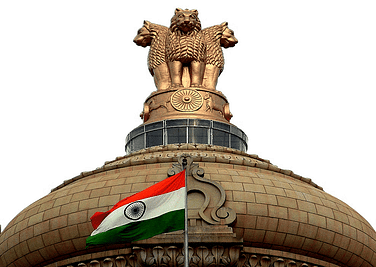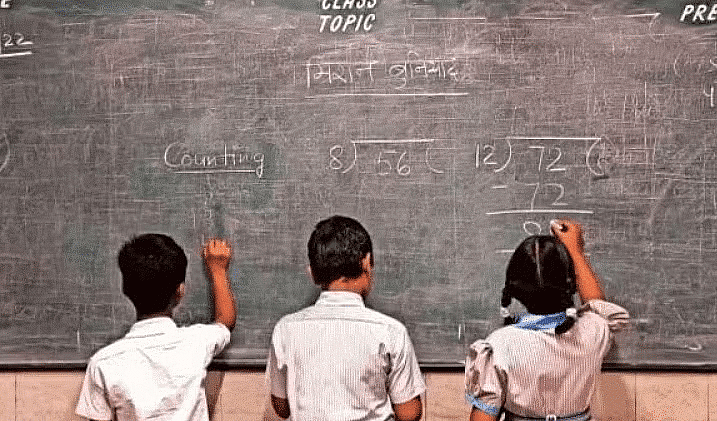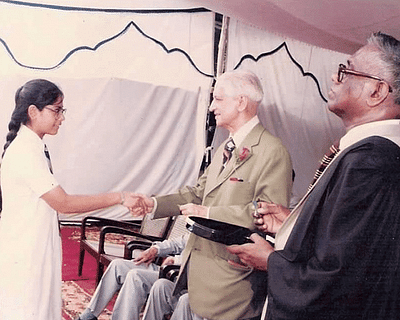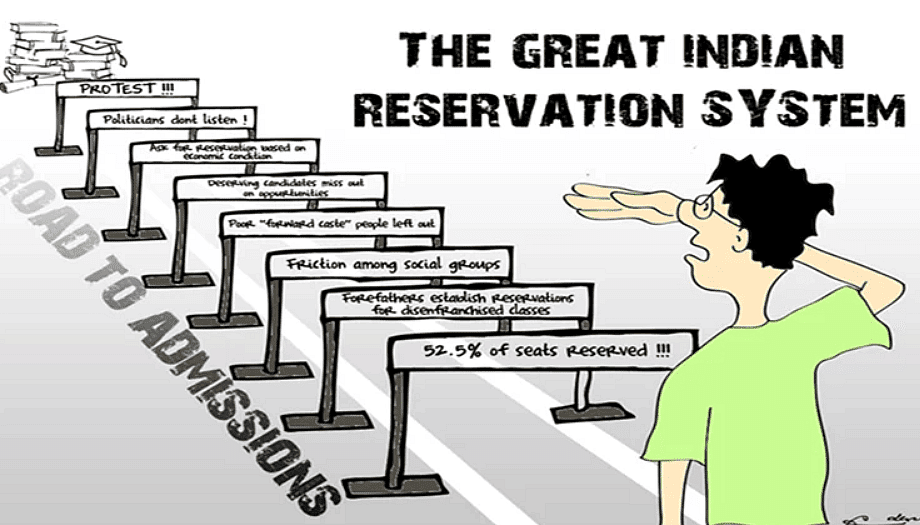Laxmikanth Summary: Special Provisions Relating To Certain Classes | Indian Polity for UPSC CSE PDF Download
The State is obligated to give special attention to the educational and economic welfare of the marginalized sections of society, particularly the Scheduled Castes and Scheduled Tribes. It should protect them from social injustice and all forms of discrimination, as outlined in Article 46 of the Constitution.
 Emblem of India
Emblem of India
Rationale of Special Provisions
In order to achieve the goals of equality and justice outlined in the Preamble, the Constitution establishes specific measures for scheduled castes (SCs), scheduled tribes (STs), backward classes (BCs), and Anglo-Indians. These provisions are outlined in Part XVI of the Constitution, spanning Articles 330 to 342A. They encompass:
- Reservation in Legislative Bodies
- Special Representation in Legislatures
- Reservation in Government Services and Positions
- Educational Grants
- Establishment of National Commissions
- Formation of Investigative Commissions
Classification of Special Provisions
(a) Permanent and Temporary:
- While some are a permanent fixture in the Constitution, others have a defined duration of operation.
(b) Protective and Developmental:
- Certain provisions are designed to shield these classes from various forms of injustice and exploitation.
- Others are geared towards fostering their socio-economic well-being.
Specification of Classes
SCs and STs
 OBCs
OBCs
Anglo-Indians
The 105th Amendment Act of 2021 clarified that the "Central List" refers to the list maintained by the central government for socially and educationally backward classes. States and union territories can now create their lists, which may differ from the Central List, but only through legislation. Unlike SCs, STs, and OBCs, the Constitution provides a specific definition for Anglo-Indians, referring to individuals with European descent in their male line, domiciled in India, and born to parents habitually residing within the country for reasons other than temporary.
Special Provisions for SCs and STs
Legislative Reservation
- Reserved seats in Lok Sabha and state legislative assemblies for SCs and STs based on population ratios.
- Originally intended for ten years (up to 1960), extended continuously; now lasts until 2030 under the 104th Amendment Act of 2019.
Claims to Services and Posts
- Consideration of SCs' and STs' claims in public service appointments without compromising administrative efficiency.
- The 82nd Amendment Act of 2000 allows provisions favoring SCs and STs, including relaxation in qualifying marks and standards for reservation in promotions.

3. National Commissions for SCs and STs
- The President establishes separate National Commissions for SCs and STs (Article 338 and 338-A) to investigate constitutional safeguards and report to Parliament.
- The 89th Amendment Act of 2003 separated the combined National Commission for SCs and STs into two distinct bodies.
4. Union Control over Scheduled Areas and ST Welfare
- The President appoints a commission to report on the administration of scheduled areas and welfare of STs in states.
- The Centre's executive power includes issuing directions to states regarding schemes for ST welfare.
- The first commission was appointed in 1960, and a second commission, chaired by Dilip Singh Shuria, was appointed in 2002, submitting its report in 2004.
Special Provisions for BCs
1. National Commission for BCs
- The National Commission for BCs was established in 1993 through parliamentary legislation.
- The 102nd Amendment Act of 2018 conferred constitutional status on the commission by inserting a new Article 338-B.
- The President is mandated to set up a National Commission for Socially and Educationally BCs to investigate matters related to their constitutional safeguards and report to Parliament. The President presents these reports, along with action taken memoranda.
 Backward Classes
Backward Classes
2. Appointment of a Commission to Investigate the Conditions of BCs
- The President can appoint a commission to investigate the conditions of socially and educationally backward classes and recommend steps for improvement.
- Two commissions have been appointed under this provision:
- The first commission, formed in 1953 under the chairmanship of Kaka Kalelkar, submitted its report in 1955, but no action was taken due to vague and impractical recommendations and internal disagreements.
- The second Backward Classes Commission, appointed in 1979 with B.P. Mandal as chairman, submitted its report in 1980. Recommendations were unattended until 1990, when the V.P. Singh Government declared 27 percent reservation in government jobs for OBCs.
Special Provisions for Anglo-Indians
1. Special Representation in Legislatures
- Before 2020, the President nominated two members from the Anglo-Indian community to the Lok Sabha if their representation was deemed inadequate.
- The governor of a state nominated one member to the State Legislative Assembly before 2020 if the community lacked adequate representation.
- Originally, this provision was to last for ten years (up to 1960), but it was continuously extended every decade. The 95th Amendment Act, 2009, extended it until 2020. However, the 104th Amendment Act, 2019, discontinued this provision, making it ineffective from January 25, 2020.
2. Special Provision in Services and Educational Grants
- Before independence, specific posts in the railway, customs, postal, and telegraph services of the Union were reserved for Anglo-Indians.
- Anglo-Indian educational institutions received special grants from the Centre and states.
- These benefits continued progressively but came to an end in 1960.
 Anglo - Indians
Anglo - Indians
3. National Commission for SCs vis-a-vis Anglo-Indians
- The National Commission for SCs has similar responsibilities for the Anglo-Indian community as it does for SCs.
- The commission investigates matters related to Constitutional and legal safeguards for Anglo-Indians and reports to the President on their efficacy.
Articles Related to Special Provisions for Certain Classes At a Glance
Article 330: Reservation of seats for scheduled castes and scheduled tribes in the House of the People.
Article 331: Representation of the Anglo-Indian community in the House of the People.
Article 332: Reservation of seats for scheduled castes and scheduled tribes in the legislative assemblies of the states.
Article 333: Representation of the Anglo-Indian community in the legislative assemblies of the states.
Article 334: Reservation of seats and special representation to cease after a certain period.
Article 335: Claims of scheduled castes and scheduled tribes to services and posts.
Article 336: Special provision for the Anglo-Indian community in certain services.
Article 337: Special provision with respect to educational grants for the benefit of the Anglo-Indian community.
Article 338: National Commission for scheduled castes.
Article 338A: National Commission for scheduled tribes.
Article 338B: National Commission for backward classes.
Article 339: Control of the Union over the administration of scheduled areas and the welfare of scheduled tribes.
Article 340: Appointment of a commission to investigate the conditions of backward classes.
Article 341: Scheduled castes.
Article 342: Scheduled tribes.
Article 342A: Socially and educationally backward classes.
|
145 videos|608 docs|203 tests
|
FAQs on Laxmikanth Summary: Special Provisions Relating To Certain Classes - Indian Polity for UPSC CSE
| 1. What is the rationale behind the special provisions for certain classes in the Indian constitution? |  |
| 2. Which classes are specifically mentioned for special provisions in the Indian constitution? |  |
| 3. What are the special provisions for SCs and STs in the Indian constitution? |  |
| 4. What special provisions are provided for Other Backward Classes (OBCs) in the Indian constitution? |  |
| 5. What special provisions are provided for Anglo-Indians in the Indian constitution? |  |

|
Explore Courses for UPSC exam
|

|
 OBCs
OBCs
















